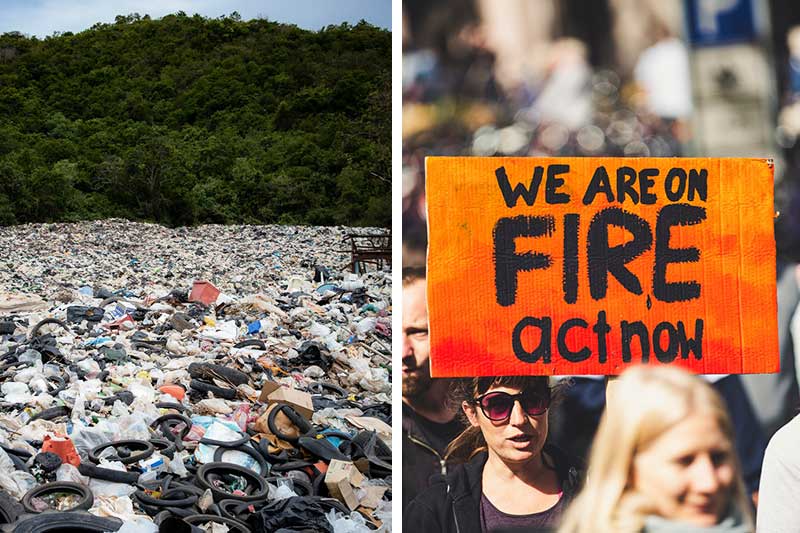Is it really smart to stay childless for the climate and the environment? If you are asking yourself this question, you are absolutely right here. More and more people are making a conscious decision not to have children in order to protect our environment. This decision is also due to the fact that they want to spare their offspring the life on a destroyed planet. But does that really make sense?
In this article, I would like to answer this question and show you what speaks for staying child-free - and in which cases it is rather counterproductive not to have children in terms of sustainability.
Why do many people not want to have children for the environment?

I myself would like to have a child - and for this very reason, I am also thinking about whether it might be more sustainable to remain childless. In this paragraph, I would first like to briefly give you the reasons why many people decide not to bring children into the world:
Poor living conditions
Those who expect worse living conditions for their own child are quick to think of staying child-free. Winter without snow, food shortages, Plastic waste in the environment, floods, droughts, forest fires, species extinction, deforested rainforests, Water shortageantibiotic resistance, infertile soils and polluted waters. Already today, these consequences of human activity are visible to everyone. But over the years, these extremes will continue to increase. A definitely scary idea. Especially if at the same time the political will is not to be seen.
Overpopulation
The global world population is growing at a rapid pace. Every additional human being poses major challenges for us as a global society - and an enormous burden for the environment. Many people therefore fear for the quality of life of their own offspring - and that they could deprive future generations of quality of life.
Resource consumption
It's not just about diapers and toys. Every person consumes throughout his or her life natural resources and therefore, soberly considered, also represents an additional burden for the planet. Whether through one's own diet, regular vacation trips by plane, the daily car journeys to work or the clothes one wears.
CO2 saving
According to one study, an average of about 58.6 tons of CO2 are emitted per year for one child. So if you were to bring just one less child into the world, you could save this amount of CO2 and help the Counteract climate change. For comparison: To live car free would relieve its own climate impact by about 2.4 tons of CO2 per year.₁
Antinatalism
Adherents of this philosophy have ethical reasons, such as the World hunger or the Environmental problems of our time, consciously refrain from having children. They want to protect other people and of course their own offspring from such scenarios.
Whether greenhouse gas emissions, waste of resources or antinatalism. All reasons are closely related and definitely sound plausible in my opinion. So are you really doing something good if you shelve your desire to have children for the sake of the environment and because of the looming future scenarios? In any case, the question is absolutely justified in principle.
The Birthstrike Movement
Striking is a popular way of drawing attention to problems and encouraging people to think differently. In addition to climate and hunger strikes, another form of strike has developed in Great Britain: the Birth Strike. The British Birthstrike movement has been joined by people who are giving up their desire to have children because of the threat of climate catastrophe and other man-made environmental problems. Together, they want to encourage politicians and society to rethink.
But is it really sustainable not to have children? In the following paragraph you can read my opinion.
Is it really sustainable not to have children because of climate change?

I consider the Birthstrike approach from the UK and the motivating motives to be fundamentally very commendable. There is nothing to criticize about standing up for the environment and the lives of future generations on the planet. In my opinion, the birthing strike for the environment, while laudable in principle, is not purposeful.
Because if people who are already aware of the environmental problems of our time do not produce offspring, the proportion of children and soon-to-be parents for whom the health of the planet plays no or only a subordinate role will increase. Under certain circumstances, this can have fatal consequences for future generations.
If you don't want to have children for environmental reasons, I think you're one of the people who should give birth to a child (or adopt one). Because you are the sustainable role model - and exemplify values such as environmental awareness and sustainability to your offspring.
And yes, at the current time, poor living conditions are to be expected. But not if more people come into the world who can create positive change and make the world more sustainable. Also, "overpopulation" or increasing world population is not the main problem. Rather, it is the behavior of each individual.
For example, we could feed significantly more than all the people in the world if all the people vegan diet.₂ Because veganism is not by chance the fastest growing global movement. It is also a movement that significantly reduces resource consumption, greenhouse gas emissions, water scarcity, and many other problems.
Tip: Please also have a look at the article about the Reasons for veganism on. You will not regret it.
So anyone who is environmentally conscious themselves need have no fear of becoming a father or mother. After all, one's own child is also very likely to become a reflective person who values these future-oriented values. So whether it makes sense not to have a child in order to lessen the burden on the environment really depends entirely on the values with which you will raise your offspring. The HOW is crucial.
Those who will raise their children to be environmentally conscious do not have to remain childless for ecological reasons

Of course, at first it may seem sensible not to put an additional burden on the planet by having a child. But it would be a pity if there were one less responsible and environmentally conscious person in the world, who in turn could impart his values to others. Nevertheless, no one has to justify not having children. Be it because of personal freedom or because of climate change. Of course, depending on one's personal ideas, one can also childless happy be. The possibility of Adoption of a child, however, should also be mentioned again at this point. Not least because here "being a parent" is possible without possible environmental concerns.
In the end, however, it is a free decision that is up to everyone. Just as free as the decision to use a basically environmentally friendly life to lead. For the change to a sustainable society, however, it is crucial that small environmentalists continue to be born in the future.
In conclusion, here are some further articles that will make sustainable parenting easier for you:
- Teaching children about environmental protection - Here's how
- Book Tip: Zero Waste Baby
- Environmental protection in everyday life
- Reasons for environmental protection at school
- Good deeds in everyday life
Do you have any questions, suggestions or other things that come to mind about childlessness for the climate and the environment? Then feel free to write me a comment.
Stay sustainable,

PS: Feel free to look further in the Blog for sustainable families around! There you will learn, for example, how to get the most live diaper free simply by following your heart.
References:
₁ S. Wynes; K. A. Nicholas; Institute of Physics: The climate mitigation gap: education and government recommendations miss the most effective individual actions (accessed July 12, 2017), available at https://iopscience.iop.org/article/10.1088/1748-9326/aa7541. [30.06.2020].
₂ M. Berners-Lee, C. Kennelly, R. Watson; et al. (2018) Current global food production is sufficient to meet human nutritional needs in 2050 provided there is radical societal adaptation, available at https://www.elementascience.org/articles/10.1525/elementa.310 [07.05.2020].






Hmm, not sure how to understand that. Counter question: Why can't adults who want children take care of the children who are already in the world? And partly grow up under undignified circumstances? Why does the " my genes" play such a role? There are enough children in the world who suffer. And wait for loving parents. That would be sustainable.
Instead, the desire to have children is always purely selfish. My genes, my heritage.
Sorry to say, but there are more than enough Latte Macciato mothers in Germany who now carry the sustainable cup from Starbucks home. And for whom the desire to have children increases proportionally with the man's income.
Hello Verena,
had treated in this articlebisher only the options "child yes" or "child no" - and the possibility of adoption came much too short. Thanks for the tip, have now also addressed it.
Many greetings
Christoph
Good, dear Christoph,
then we were both possibly misunderstanding, sorry.
Nevertheless, and despite the indisputably far too wasteful West, there are simply "the limits of growth" which I consider to have already been clearly exceeded. A "back to nature" does not change the fact that the population density is not in proportion to what Mother Earth can cope with. Even if all at once everyone agrees to live "consciously" from now on, one achieves, as I said, at best a postponement of the collapse, if the multiplication is not restrained. Instead, there are "family-friendly" policies, a health care system that increases life expectancy (and thus the individual footprint) through ever new findings, religions that call contraception the devil's work. This cannot work.
By the way, I am childless, as you may have already heard, and I am slowly reaching retirement age. I think I would reproach myself today if I had brought children into the world.
Moin dear Matthias, then I am reassured 🙂 .
It is quite possible that it makes sense for ecological motives not to produce children at all. But basically we humans (even with 11 billion inhabitants) are able to live in such a way that the resources of nature can recover. Currently we live, example mass animal husbandry, much too resource-wasting and environmentally destructive. With a general plant-based diet, no one would have to go hungry anymore and large areas of land would be freed up to support biodiversity, CO2 storage in forests, etc. This is still a long way off. This is still a long way off - but it is even further off that all people will give up their offspring for the sake of the environment. This is precisely why the overriding goal must be to achieve a more sustainable way of life for our society - through education and by setting an example.
Best regards
Christoph
Hello Christoph,
On the whole, I agree with you, however, your article from "antinatalism" takes a strange and unpleasant turn in my eyes. Without question, all our environmental problems are actually due to overpopulation. In Germany they are working hard to delay the collapse, but it can't work if they don't work causally and globally on a reduction of reproduction. Also many small environmentalists lead at best to a delay.
Your argumentation sounds to me like "we are the good guys!" and loses sight of the effects of further growth or even just standstill. Honestly, the plea for a multiplication/education according to one's own ideal reminded me directly of Himmler's "Lebensborn", which hardly anyone will approve of today.
Moin Matthias, you are comparing my factually elaborated and presented position on whether it makes sense not to father any more children at all with Lebensborn e.V. 😀 I hope you are not serious.
I am not saying in any word that anyone is a better person - or that "more of them" should be conceived.
This article is only intended to help answer the above question - and nothing more. It is neither 100% sensible not to have children, nor 100% sensible to have a child if you want to do the environment a favor. Everything in between is discussed in this post, as it is a personal matter of consideration, depending on what is important to you.
Nor is overpopulation the root "actually" of all environmental problems. It is people's lifestyles - and predominantly the lifestyles of people in the Western world - that drive climate change. Meat consumption, flights, etc. About 90 percent of all people have never been on an airplane. About 30 percent of Germans fly 1-2 times a year by airplane. These are the causes of the biggest environmental problems - and not that a woman in Africa produces more than 5 children on average.
Everyone should start with themselves - and not use the growing world population as an excuse for not having to change themselves.
Many greetings,
Christoph
Comments are closed.